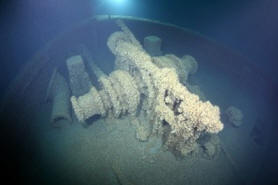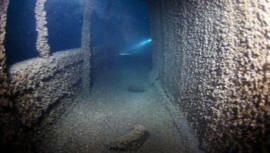|
A great wooden steamship that sank more than a century ago in a
violent Lake Michigan storm has been found off the Milwaukee-area shoreline, and
divers say the intact vessel appears to have been perfectly preserved by the
cold fresh waters.
 Finding
the 300-foot-long L.R. Doty was important because it was the largest wooden ship
that remained unaccounted for, said Brendon Baillod, the president of the
Wisconsin Underwater Archaeology Association. Finding
the 300-foot-long L.R. Doty was important because it was the largest wooden ship
that remained unaccounted for, said Brendon Baillod, the president of the
Wisconsin Underwater Archaeology Association.
This photograph by Great Lakes Shipwreck
Research, shows the windlass .
"It's the biggest one I've been involved with," said Baillod,
who has taken part in about a dozen such finds. "It was really exhilarating."
The Doty was carrying a cargo of corn from South Chicago to Ontario, Canada in
October 1898 when it sailed into a terrible storm, Baillod said. Along with snow
and sleet, there were heavy winds that whipped up waves of up to 30 feet.
The Doty should have been able to handle the weather. The ship was only five
years old, and the 300-foot wooden behemoth's hull was reinforced with steel
arches.
But it was towing a small schooner, the Olive Jeanette, which began to founder
in the storm after the tow line apparently snapped, Baillod said. The Doty
probably sank when it came to the schooner's aid. All 17 of its crew members
died, along with the ship's cats, Dewey and Watson.
As a maritime historian Baillod spent more than 20 years researching the
shipwreck. He knew that swaths of debris had washed up afterward in Kenosha,
about 40 miles south of Milwaukee. But he found news accounts that it had last
been seen closer to Milwaukee, near Oak Creek.
Meanwhile, a Milwaukee fisherman in 1991 reported snagging his nets on an
obstruction about 300 feet under water. The observation was largely forgotten
for decades until diving technology improved enough to enable exploration at
that depth.
 A
number of explorers did some preliminary scouting on the lake's surface in
recent months, using deep-sea technology to find a massive submerged object.
Divers waited until last week to descend, when the weather was just right. A
number of explorers did some preliminary scouting on the lake's surface in
recent months, using deep-sea technology to find a massive submerged object.
Divers waited until last week to descend, when the weather was just right.
As soon as they got to the lake floor they knew they had found the Doty.
"It felt so good to solve this," said Jitka Hanakova, 33, a diver and captain of
the charter boat that led the exploration. "This ship has been missing for so
many years and it's one of the biggest out there."
Divers found the ship upright and intact, settled into the clay at the lake's
bottom. Even the ship's cargo of corn was still in its hold.
The Doty is so well-preserved because it's in a cold, freshwater lake. It's also
far enough below the surface that storms don't affect it.
Those same factors mean the crew's corpses are likely intact as well, Baillod
said. Their bodies are probably still in the boiler room, where the sailors must
have huddled as the ship went down, he added.
 While
details of the sinking remain unclear, Baillod said the most likely explanation
is that rudder chain snapped while the Doty was turning around to aid the Olive
Jeanette. That would have left the 20-foot-tall ship at the mercy of 30-foot
waves that would have dumped tons of water on the fragile wooden hatches. While
details of the sinking remain unclear, Baillod said the most likely explanation
is that rudder chain snapped while the Doty was turning around to aid the Olive
Jeanette. That would have left the 20-foot-tall ship at the mercy of 30-foot
waves that would have dumped tons of water on the fragile wooden hatches.
"When the rudder broke (the crew) must have known they were going to die,"
Baillod said. "They probably had a good hour to contemplate their fate until the
cargo holds collapsed."
There are no plans to raise the Doty, which is now the property of the state of
Wisconsin. The ship will remain preserved indefinitely where it is, rather than
exposing it to air that would cause it to rot away within a few years, Baillod
said.
Few divers are expected to disturb it. It's in such deep water that only a small
group of highly experienced divers can access it, Hanakova said.
Thousands of ships remain submerged in the Great Lakes, some vessels scuttled
and others the victims of shipwrecks. Lake Michigan has about 500 dive-worthy
ships still to be found, Baillod estimated.
He said his next target is the largest known missing ship: the car ferry Pere
Marquette 18. He said it went down in 1910, about 20 miles from the southeastern
Wisconsin shore.
The new technology that made finding the Doty possible can also help locate the
Pere Marquette, he said.
"What's nice about finding these ships is, it contributes to our cultural
history," he said. "Many people are disconnected from history so it's nice to
reconnect to our past — to maybe look out today and think of the wooden
steamships that were out there 100 years ago.
Article
by Associated Press Writer Dinesh Ramde, |
|
 |








